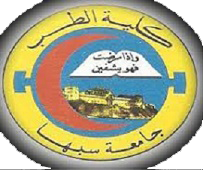مقرر علم الاطفال
This course is designed to support acquisition of basic knowledge of normal and abnormal growth and development (physical, physiologic, psychosocial), and its clinical application from birth through adolescence. It also enables students to provide basic health care for individuals in the Paediatric age group (neonates, infants, children and adolescents).
The course is made to provide students with an appropriate background covering the common and important Pediatric emergencies and diseases and to enable the development and application of appropriate professional attitudes, communication and problem solving skills.
- Learning Outcomes:
By the end of the course, students should be able to:
- Describe normal growth and development during infancy, childhood and adolescence.
- Describe appropriate management for abnormalities affecting growth and development.
- Demonstrate an understanding of the impact of congenital and inherited diseases on children and their families.
- Determine the nutritional requirements and the most common nutritional disorders affecting infants and children, and describe appropriate management for disorders.
- Describe the indications, contraindications, administration and precautions of the immunizations necessary for infants and children according to the national schedule and the condition of the child.
- Recognize the most important behavioral and social issues during childhood and adolescence.
- Describe appropriate measures for health promotion as well as prevention of disease and injury in infants, children and adolescents.
- Cite the management priorities for different neonatal and Paediatric emergencies.
- Describe the causes and pathogenesis of the most important neonatal and Paediatric problems.
- Describe the clinical symptoms and signs of the most important neonatal and Paediatric problems.
- Identify the appropriate diagnostic tools (and describe how they would be interpreted) and therapeutic lines for the most important neonatal and Paediatric problems.
- Professional and Practical Skills:
By the end of the course, students should be able:
- Check vital signs in neonates, infants, children and adolescents.
- Assess physical and mental development in neonates, infants, children and adolescents according to standard milestones and recognize abnormalities.
- Perform appropriate clinical and anthropometries assessments for the nutritional status of infants and children.
- Recognize different neonatal and Paediatric emergencies.
- Construct a proper history for a patient in the Pediatric age group.
- Perform an adequate clinical examination for a patient in the Pediatric age group and identify deviations from normal.
- Interpret patient’s data in an organized and informative manner.
-
- Illustrated lectures ( 60 hours ) : Large group plenary sessions in lecture theaters are time tabled, they set the scene for a topic, highlight important issues and arouse curiosity in relevant areas.
- Clinical rounds ( 120 hours ) : Tutors demonstrate the core practical clinical skills and students practice these skills on patient’s under supervision for 3 hours daily.
- Problem based learning: To study written descriptions of clinical situations.
- Tutorial (small groups) ( 468 hours ) : For giving introduction, indications and interpretations of clinical laboratory tests, radiography and electrocardiography
- Practical clinical technique: Focus on the development of practical skills
appropriate to the clinical situation.
- Assignment (mini lecture): Each student completes a review on a selected topic and delivered in a known dead time
- Attendance with guidance (once weekly).
-
Examination are held twice yearly. First examination takes place in November-December and supplementary examination is held in May-June. Examination is carried out in three parts as follows:
1-Written Examination:
Paper I(Essay) ……………… 4 questions………………….. 40 marks. (20%)
Paper II (MCQ) ………………..60 questions…………………..40 marks. (20%)
Pass marks = 48 (60 %).
2-Clinical Examination:
One long case ……………………………. 60 marks. (30%)
Two short cases ……………………………. 40 marks. (20%)
Pass mark =60 (60 %).
3-Oral Examination:
Examiner can ask any question in the field of paediatric …….. 20 marks. (10%)
Pass mark = 12 (60 %).
Each candidate has to pass in clinical as well as total scoring of at least 60 % of total marks (200 mark) .
Examiner : Internal examiners and external examiners

